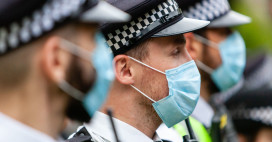
In September, Fair Trials joined a 123-strong coalition of NGOs in the UK that called on the Government to scrap its Bill of Rights – alternatively known as the ‘Rights Removal Bill’. If made into law, the rights Removal Bill will strip away our rights, impede access to justice, and undermine peace and security.
The Government has heralded the Rights Removal Bill as an expression of the UK’s commitment to international human rights standards, and an instrument that reinjects much-needed common sense into human rights law. The Bill amounts to neither of those things. It is an incoherent string of political sound bites and poorly thought-out ideas that have no place in a modern democracy.
The Bill mounts a targeted assault on people in conflict with the criminal justice system and non-British nationals, as if their status of their previous experiences make them less deserving of recognition as ‘humans’ who have an inherent entitlement to exercise their fundamental rights.
It says that their family and their ties to the UK don’t matter when they are being considered for deportation; it emphasises the need for prisoners’ human rights to be limited when they are asking to be released; and it relieves the police of their duties to protect people ‘engaged in criminal activity’, irrespective of what the nature of these activities are, like any other member of the public.
While the Government talks about protecting human rights, it is insistent that the UK should not be bound by those very same standards. The Rights Removal Bill will effectively make it optional for the UK to comply with the rulings of the European Court of Human Rights, even those relating to the right to a fair trial under Article 6 of the European Convention.
In an apparent attempt to make good on the promises to advance fundamental freedoms, the Bill purports to defend the right to a fair trial by reinforcing the right to be tried by a jury, and it emphasises the importance of protecting the freedom of expression.
The jury trial, however, was never under threat because of the Human Rights Act. The European Convention on Human Rights is agnostic on the question of whether a jury trial is an integral aspect of the right to a fair trial, and the Bill itself acknowledges that the Parliament can carve out numerous exceptions to this right. And this is something that the Government has already been doing. It recently increased the sentencing powers of magistrates’ courts, meaning that more people will face non-jury trials.
It is also clear that the Government’s commitment to protect the freedom of expression is a disingenuous one. The Government has been passing a series of laws aimed at curbing freedom of expression, including the Police, Crime, Sentencing and Courts Act, which greatly expanded police powers to shut down protests, and is now attempting to pass the Public Order Bill which places even more draconian restrictions on the right to protest.
Further, it is deeply disappointing and worrying that the Government fails to recognise the wider implications of the Rights Removal Bill beyond the shores of Great Britain. It brushes aside the fact that the European Convention on Human Rights underpins peace in Northern Ireland and its relationships with Europe. It has also completely failed to consider the message the repeal of the Human Rights Act will send to the rest of the world, giving free licence, or even tacit approval to authoritarian-leaning governments and regimes to wilfully ignore international and regional human rights frameworks.
We need the Human Rights Act, because this is the best protection we have against the state’s misuses and abuses of its power. It guarantees that our basic rights will be respected, no matter who we are, and that we have ways of enforcing them. Any attempt to undermine this will have disastrous consequences not just on people most vulnerable to human rights violations, but also to individuals, families, and communities in the UK and beyond.


